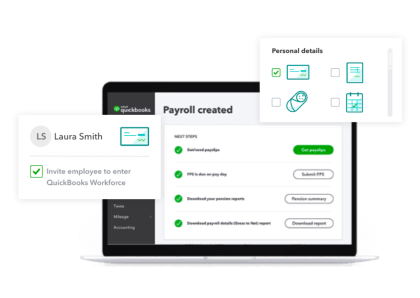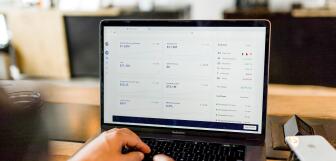Bookkeeping for Restaurants: How to Master It
There are many barriers to your restaurant's success. Long hours, high operating costs and the ever-changing landscape of regulations can make it difficult to turn a profit.
But for restaurant owners who love the business and the industry, there's no better challenge than overcoming the odds—and having a successful and profitable business where customers can enjoy your food, drinks and atmosphere.
One of the most important elements of your restaurant's financial health is managing your restaurant bookkeeping effectively. For restaurant owners, you must keep accurate and up-to-date books so you know your financials inside and out.
Fortunately, you can take some relatively simple steps to ensure your bookkeeping is in tip top shape. Let's go over a few basics so you can start mastering the art of restaurant bookkeeping.
What is restaurant accounting?
First and foremost, let's understand the basics of restaurant accounting (also referred to as bookkeeping for the restaurant industry). Restaurant accounting is a financial process that involves recording and organising financial transactions related to running a restaurant.
It's important to keep accurate records of every transaction in your restaurant so you can track spending, identify areas for improvement and manage taxes properly.
What financial transactions should you track in restaurant accounting?
It's important to track transactions such as:
- incoming payments from customers
- outgoing payments for suppliers and vendors
- payroll expenses
- Operating expenses
- taxes and insurance
- rent or mortgage payments
You should also keep detailed financial records of all your restaurant bank accounts, including your business checking, savings and credit card accounts.
This will help you keep track of ALL recorded financial transactions so you know what's going on with your financials at all times
Benefits of restaurant bookkeeping
Before we dive into our 5-step guide to restaurant bookkeeping, let's take a minute to discuss why it's important. Not only is it essential for managing your business, but restaurant bookkeeping can provide valuable insights into optimising your business operations and maximising profits.
Here are just some of the benefits of keeping track of your financials:
- Track restaurant expenses and income to identify areas of your business that need improvement
- Better understand how much revenue you're bringing in, and where it's coming from
- Monitor and forecast cash flow so you can plan ahead
- Understand the financial health of your restaurant at all times
- Easily prepare taxes and financial statements
- Spot potential issues and problems before they become major problems
- Get access to credit if needed
- Easily monitor payroll and employee hours
Now that you know why restaurant bookkeeping is so important, let's talk about the basics of how to get started
5 steps to mastering restaurant bookkeeping for your restaurant
Step 1: Track your daily sales on a POS system
It's important to keep track of your daily sales to monitor cash flow and understand where money is coming and going. A Point-of-Sale (POS) system can help you easily manage this process.
A good restaurant POS system will generate detailed daily sales, inventory, and staffing reports. All this data can be used to identify areas of the business that need improvement.
You can also find specialised hospitality POS systems with features designed to streamline restaurant operations.
From employee management to table service, app integrations, payment processing services and customer loyalty programs, these systems can help you easily stay on top of your restaurant business.
Step 2: Streamline your Accounts Payable
It's important to stay on top of your Accounts Payable, so you know exactly what money is owed to suppliers and vendors.
For those who aren't yet aware, Accounts Payable is the money you owe to suppliers and vendors for goods or services needed to run your restaurant. For example, if you own a small food truck business, your Accounts Payable would include food, supplies and equipment expenses.
Quickbooks is one popular and comprehensive accounting software that can help you manage your Accounts Payable. It's an easy-to-use platform that allows you to track invoices, pay bills on time, set up payment reminders and export data into other programs.

Integrate With Quickbooks
With QuickBooks Online and Epos Now, you can quickly export your sales data and save on average 8 hours of work per month on your accounts.
Step 3: Simplify your payroll processing
Payroll processing can be time-consuming and complex, with many payroll liabilities. However, it doesn't have to be.
The right payroll and accounting software can make tracking employee hours, wages and payroll taxes much easier. With this data you can easily determine how much money you need to set aside for payroll each month and ensure your payroll taxes are paid on time. Moreover, payroll software can also help you comply with local and national regulations.
Many programs have built-in compliance features so you don't have to worry about missing any important rules or deadlines. Plus, if you need additional help understanding the laws and regulations, software companies like ADP offer comprehensive support services for employers.
Step 4: Reconciliation is key
Reconciliation is the process of comparing different sets of financial data to make sure they match up. For example, you might need to reconcile your bank statements and credit card bills with the financial reports generated by your POS system.
Reconciliation ensures accuracy and prevents fraud and accounting errors, so this process must be conducted regularly. Today's restaurant accounting tools make reconciliation simple. You can quickly upload your bank and credit card statements, compare them with your reports, and generate accurate financial statements in minutes.
Step 5: Calculate your costs
Restaurant costs come in all shapes and sizes, from food costs to labour costs and everything in between and understanding your overhead costs is key to managing your budget.
Some of the most important costs to keep track of include:
- Cost of goods sold (COGS): This is the cost of products you sell, such as food and beverages
- Labour costs: This includes wages, taxes and other employee-related expenses
- Rent/lease: This includes rent or mortgage payments for your restaurant space
- Utilities: This includes electricity, water, gas and other utility bills
- Equipment: This includes kitchen equipment, furniture and other items you purchase for your restaurant
- Food costs: Your food costs include ingredients, packaging and other food-related expenses
- Marketing and administration: This includes advertising costs, business insurance and other non-product related expenses
Once you know your costs, set aside a budget for each expense so you can easily monitor how much money is being spent on what.
Tips for your financial strategy
Start with a financial plan:
It's important to have an overarching financial plan before you get started with restaurant bookkeeping. A financial plan will help you stay organised and track your financial progress and metrics.
Some things you should include in your financial plan are:
- A budget for each month
- Financial goals and targets
- Cash flow projections
- Strategies to reduce costs and increase revenue
Automate your processes:
Automating financial processes can make life easier for the busy restaurateur. An automated accounting system can help you track invoices, manage payments and reconcile financial data quickly and easily.
Stay organised:
Keep your financial records organised by creating a financial filing system and creating digital backups of important documents. This will make it much easier to keep track of financial information at tax time.
Monitor your financial progress:
Track your financial goals and progress regularly. Monitor key financial metrics such as profits, expenses and cash flow to gain insights into your restaurant's financial health.
Some KPIs to keep an eye on include:
- Revenue growth
- Cost of goods sold (COGS)
- Gross profit margins
- Net profit margins
- Cash flow statement
Keep accurate records:
Accurate financial records are essential for tax filing and compliance with local laws. Ensure you document all transactions to easily access financial information when needed.
Remember, a POS system and financial software will help you manage your financials more efficiently. With the right tools, you can easily track financial data, generate accurate financial reports and monitor restaurant performance.
With these tips in mind, you can become an expert at restaurant bookkeeping in no time! With the right financial systems and processes in place, you'll be able to easily manage your financial data and keep your restaurant running smoothly.
Final thoughts
The restaurant industry is a high-stakes business, and financial management is key to its success.
By following the steps outlined above, you can develop an effective financial strategy for your restaurant and stay on top of your expenses.
With the right bookkeeping tools in place, you'll have the data necessary to make informed financial decisions that will help keep your business profitable.
Good luck!
Manage a hotel? Check out our hotel operations management guide to learn more about financial management and other aspects of running a successful hotel.



